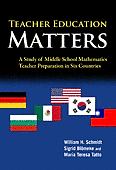
Today I happened to stumble across a very interesting new book by the authors of TIMSS Study (Third International Mathematics an Science Study): Teacher Education Matters A Study of Middle School Mathematics Teacher Preparation in Six Countries by William H. Schmidt, Sigrid Blömeke, and Maria Teresa Tatto, Pub Date: January 2011, 352 pages. In their new book, the authors describe the results of a new international study comparing middle school mathematics teaching in six different countries: US, South Korea, Taiwan, Bulgaria, Germany and Mexico. I haven’t had a chance to read the book carefully yet, but from what I saw already (and it was hard for me to put the book down), it is a much needed study. For example, the authors surveys mathematics teachers in these countries for pedagogical and content knowledge of middle school mathematics. Interestingly enough, the knowledge of North American teachers have been the lowest one (except for the teachers from Mexico most of whom have never studied mathematics in college). On the other hand, their knowledge of pedagogy was on many occasions higher than that of their colleagues. It made me think, how in North America did we get to such a gap between the two? How did we get to the idea that the lack of content knowledge can be replaced by very sophisticated pedagogical knowledge. I have been thinking a lot about it recently in the context of teaching science methods courses. The students I teach have very little science background, yet, they will be certified to teach science (grades K-8). Interestingly many of them believe, that they will be able to pick it up from the textbook and what they really need is the knowledge of how to teach science without contextualizing it. The more I deal with future teachers, the more I tend to think that a one year teacher education program is not the solution if we want to have teachers who have deep pedagogical and content knowledge. To become a teacher you have to study the content you are going to be teaching at a very different level. For example, how can we have elementary teachers teaching grades K-8 when they have very limited knowledge of mathematics and science? Do we just rely on the further professional development? Where will they pick it up? What about their knowledge of other fields? Being a university physics teacher for almost 15 years, I know the students who take our introductory science classes do not have a deep conceptual understanding of science. Only few have it and these are most often NOT the students who decide to pursue a teaching career. I have met many amazing science and mathematics teachers over my career and the more I see these people, the more I realize they are the EXCEPTION from the rule. We need to figure out who we want to teach our kids and this leads me to the key question I am trying to answer but haven’t been able to figure out yet: WHO GOES INTO A TEACHING CAREER IN CANADA? Who do we accept to be a teacher? What are our criteria? Is it a valid expectation to ask somebody to specialize to teach ALL subjects from grades K-7? While some of the provinces have middle schools, many don’t and many teachers will be teaching the entire spectrum of grades over their career? Is it fair to the teachers to expect them to be able to do that? I do not have the answers to these questions, but I know that the book that I have in front of me will help me think about it. I think it is a MUST read for any science or mathematics educator.
